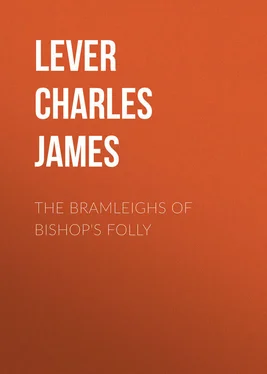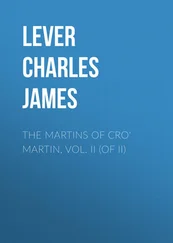Charles Lever - The Bramleighs of Bishop's Folly
Здесь есть возможность читать онлайн «Charles Lever - The Bramleighs of Bishop's Folly» — ознакомительный отрывок электронной книги совершенно бесплатно, а после прочтения отрывка купить полную версию. В некоторых случаях можно слушать аудио, скачать через торрент в формате fb2 и присутствует краткое содержание. Издательство: Иностранный паблик, Жанр: literature_19, foreign_antique, foreign_prose, на английском языке. Описание произведения, (предисловие) а так же отзывы посетителей доступны на портале библиотеки ЛибКат.
- Название:The Bramleighs of Bishop's Folly
- Автор:
- Издательство:Иностранный паблик
- Жанр:
- Год:неизвестен
- ISBN:нет данных
- Рейтинг книги:4 / 5. Голосов: 1
-
Избранное:Добавить в избранное
- Отзывы:
-
Ваша оценка:
- 80
- 1
- 2
- 3
- 4
- 5
The Bramleighs of Bishop's Folly: краткое содержание, описание и аннотация
Предлагаем к чтению аннотацию, описание, краткое содержание или предисловие (зависит от того, что написал сам автор книги «The Bramleighs of Bishop's Folly»). Если вы не нашли необходимую информацию о книге — напишите в комментариях, мы постараемся отыскать её.
The Bramleighs of Bishop's Folly — читать онлайн ознакомительный отрывок
Ниже представлен текст книги, разбитый по страницам. Система сохранения места последней прочитанной страницы, позволяет с удобством читать онлайн бесплатно книгу «The Bramleighs of Bishop's Folly», без необходимости каждый раз заново искать на чём Вы остановились. Поставьте закладку, и сможете в любой момент перейти на страницу, на которой закончили чтение.
Интервал:
Закладка:
“It is my own temper, too,” she added. “You may convince, you cannot coerce me.”
“I wish I might try the former,” said he, in a tone of much meaning.
“We agree in so many things, my Lord,” said she, laughingly, “that there is little occasion for your persuasive power. There, do you see that smoke-wreath yonder? That’s from the cottage where we’re going.”
“I wish I knew where we were going,” said he, with a sigh of wonderful tenderness.
“To Roseneath, my Lord. I told you the L’Estranges lived there.”
“Yes; but it was not that I meant,” added he, feelingly.
“And a pretty spot it is,” continued she, purposely misunderstanding him; “so sheltered and secluded. By the way, what do you think of the curate’s sister? She is very beautiful, isn’t she?”
“Am I to say the truth?”
“Of course you are.”
“I mean, may I speak as though we knew each other very well, and could talk in confidence together?”
“That is what I mean.”
“And wish?” added he.
“Well, and wish, if you will supply the word.”
“If I am to be frank, then, I don’t admire her.”
“Not think her beautiful?”
“Yes; there is some beauty, – a good deal of beauty, if you like; but somehow it is not allied with that brightness that seems to accentuate beauty. She is tame and cold.”
“I think men generally accuse her of coquetry.”
“And there is coquetry, too; but of that character the French call minauderie , the weapon of a very small enchantress, I assure you.”
“You are, then, for the captivations that give no quarter?” said she, smiling.
“It is a glory to be so vanquished,” said he, heroically.
“My sister declared the other night, after Julia had sung that barcarolle, that you were fatally smitten.”
“And did you concur in the judgment?” asked he, tenderly.
“At first, perhaps I did; but when I came to know you a little better – ”
“After our talk on the terrace?”
“And even before that. When Julia was singing for you, – clearly for you, there was no disguise in the matter, – and I whispered you, ‘What courage you have!’ you said, ‘I have been so often under fire’ – from that instant I knew you.”
“Knew me – how far?”
“Enough to know that it was not to such captivations you would yield, – that you had seen a great deal of that sort of thing.”
“Oh, have I not!”
“Perhaps not always unscathed,” said she, with a sly glance.
“I will scarcely go that far,” replied he, with the air of a man on the best possible terms with himself. “They say he is the best rider who has had the most falls. At least, it may be said that he who has met no disasters has encountered few perils.”
“Now, my Lord, you can see the cottage completely. Is it not very pretty, and very picturesque, and is there not something very interesting – touching almost, in the thought of beauty and captivation – dwelling in this un-travelled wilderness?”
He almost gave a little shudder, as his eye followed the line of the rugged mountain, till it blended with the bleak and shingly shore on which the waves were now washing in measured plash, – the one sound in the universal silence around.
“Nothing but being desperately in love could make this solitude endurable,” said he at last.
“Why not try that resource, my Lord? I could almost promise you that the young lady who lives yonder is quite ready to be adored and worshipped, and all that sort of thing; and it would be such a boon on the frosty days, when the ground is too hard for hunting, to have this little bit of romance awaiting you.”
“Coquetry and French cookery pall upon a man who has lived all his life abroad, and he actually longs for a little plain diet, in manners as well as meals.”
“And then you have seen all the pretty acts of our very pretty neighbor so much better done?”
“Done by real artists,” added he.
“Just so. Amateurship is always a poor thing. This is the way, my Lord. If you will follow me, I will be your guide here; the path here is very slippery, and you must take care how you go.”
“When I fall, it shall be at your feet,” said he, with his hand on his heart.
As they gained the bottom of the little ravine down which the footpath lay, they found Julia, hoe in hand, at work in the garden before the door. Her dark woollen dress and her straw hat were only relieved in color by a blue ribbon round her throat, but she was slightly flushed by exercise, and a little flurried, perhaps, by the surprise of seeing them, and her beauty, this time, certainly lacked nothing of that brilliancy which Lord Culduff had pronounced it deficient in.
“My brother will be so sorry to have missed you, my Lord,” said she, leading the way into the little drawing-room, where, amidst many signs of narrow fortune, there were two or three of those indications which vouch for cultivated tastes and pleasures.
“I had told Lord Culduff so much about your cottage, Julia,” said Marion, “that he insisted on coming to see it, without even apprising you of his intention.”
“It is just as well,” said she artlessly. “A little more or less sun gives the only change in its appearance. Lord Culduff sees it now as it looks nearly every day.”
“And very charming that is,” said he, walking to the window and looking out. And then he asked the name of a headland, and how a small rocky island was called, and on which side lay the village of Portshandon, and at what distance was the church, the replies to which seemed to afford him unmixed satisfaction; for, as he resumed his seat, he muttered several times to himself, “Very delightful indeed; very pleasing in every way!”
“Lord Culduff was asking me, as he came-along,” said Marion, “whether I thought the solitude – I think he called it the savagery of this spot – was likely to be better borne by one native to such wildness, or by one so graced and gifted as yourself, and I protest he puzzled me.”
“I used to think it very lonely when I came here first, but I believe I should be sorry to leave it now,” said Julia, calmly.
“There, my Lord,” said Marion, “you are to pick your answer out of that.”
“As to those resources which you are so flattering as to call my gifts and graces,” said Julia, laughing, “such of them at least as lighten the solitude were all learned here, I never took to gardening before; I never fed poultry.”
“Oh, Julia! have mercy on our illusions!”
“You must tell me what they are, before I can spare them. The curate’s sister has no claim to be thought an enchanted princess.”
“It is all enchantment!” said Lord Culduff, who had only very imperfectly caught what she said.
“Then, I suppose, my Lord,” said Marion, haughtily, “I ought to rescue you before the spell is complete, as I came here in quality of guide.” And she rose as she spoke. “The piano has not been opened to-day, Julia. I take it you seldom sing of a morning?”
“Very seldom, indeed.”
“So I told Lord Culduff; but I promised him his recompense in the evening. You are coming to us to-morrow, ain’t you?”
“I fear not. I think George made our excuses. We are to have Mr. Longworth and a French friend of his here with us.”
“You see, my Lord, what a gay neighborhood we have; here is a rival dinner-party,” said Marion.
“There’s no question of a dinner; they come to tea, I assure you,” said Julia, laughing.
“No, my Lord, it’s useless; quite hopeless. I assure you she ‘ll not sing for you of a morning.” This speech was addressed to Lord Culduff, as he was turning over some music-books on the piano.
Читать дальшеИнтервал:
Закладка:
Похожие книги на «The Bramleighs of Bishop's Folly»
Представляем Вашему вниманию похожие книги на «The Bramleighs of Bishop's Folly» списком для выбора. Мы отобрали схожую по названию и смыслу литературу в надежде предоставить читателям больше вариантов отыскать новые, интересные, ещё непрочитанные произведения.
Обсуждение, отзывы о книге «The Bramleighs of Bishop's Folly» и просто собственные мнения читателей. Оставьте ваши комментарии, напишите, что Вы думаете о произведении, его смысле или главных героях. Укажите что конкретно понравилось, а что нет, и почему Вы так считаете.












